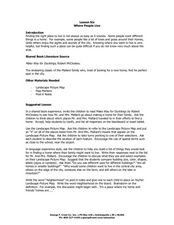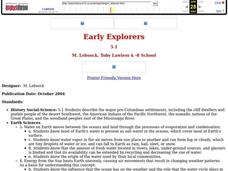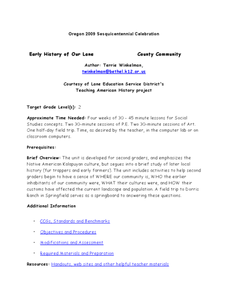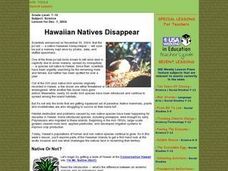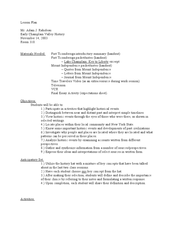Curated OER
Native Americans of the Chesapeake Bay: Using Primary vs. Secondary Sources
Discover the rich Native American culture that existed at the time of early European exploration into the Chesapeake region through analysis of several primary and secondary sources.
Curated OER
Respecting Nonreligious People
Help students understand what an atheist is and why it is important or respect their beliefs. Using this non believers lesson, students will learn about people who hold different beliefs are discriminated against by others. They will...
Curated OER
Worship in Early Times
Students listen to and discuss three radio broadcasts that deal with worship in early times. They investigate a wide range of historical sources and piece together evidence of the past, Celtic beliefs and how early people worshiped...
Curated OER
Was There an Industrial Revolution? Americans at Work Before the Civil War
High schoolers investigate the First U.S. Industrial Revolution. They identify positive and negative effects of early industrialization, read first-hand accounts, role-play and interview individuals, and participate in a debate.
National Endowment for the Humanities
Who Were the Foremothers of the Women's Suffrage and Equality Movements?
Young scholars complete a unit of lessons on the women who contributed to the early Women's Rights Movement in the U.S. They conduct Internet research, examine images online, develop a list of women, complete a worksheet, and create a...
Smithsonian Institution
Who's in Camp?
Pupils complete readings, a group activity using cards, and a writing activity to better understand people's lives during the American Revolution. The resource emphasizes people such as the militiamen, women, officers, and children,...
Curated OER
Food: Early American Food Cycles Web Quest
Students complete a Web Quest on ways that Native Americans hunted for, harvested, stored, and prepared food and what types of natural foods were eaten. In this early American food cycles lesson plan, students discover many of the ways...
Curated OER
Lesson Six Where People Live
Students investigate where people live. In this early geography lesson, students read Make Way for Ducklings! by Robert McCloskey and then discuss what neighborhoods are as they identify them on landscape picture maps.
Curated OER
Fourth Grade Social Studies
In this social studies worksheet, 4th graders answer multiple choice questions about George Washington, early America, natural resources, and more. Students complete 8 questions.
Curated OER
The Emerging American Identity
Young scholars define what it meant to be an American early on in the nation's history. In this American identity lesson, students examine the noted quotations and determine what was meant by each of the authors with regards to an...
History with Peters
A Clear Signal for Change: Multiple Interpretations and Nat Turner’s Rebellion
Was Nat Turner a hero or a violent criminal? Using primary sources and images that discuss the rebellion of enslaved people he led in antebellum Virginia, scholars consider the question. Then, they create memorials to Turner and...
Roy Rosenzweig Center for History and New Media
American Indians and their Environment
People could take a page in ingenuity and survival from the Powhatans. Deer skins became clothes, and the members of the Native American group farmed the rich Virginia soil and hunted in its forests for food. Using images of artifacts...
Curated OER
Day and Night
Good Night, Moon is a classic little ones absolutely love. It's a sweet book that can be used, as in this lesson, to start a conversation about the difference between night and day. After reading the story, the class brainstorms...
Curated OER
Discovering Prehistoric People of Wisconsin
Students list the characteristics of the four main groups of prehistoric people of Wisconsin. They compare the characteristics of the groups of to determine the chronological order of existence in Wisconsin.
Curated OER
Crossroads of the Continent: Early Trade in Kansas
Students study early Native American-European trade. They play bartering games to discover trade as an economic funtion, as well as other implications of trading one good for another.
Curated OER
Entertainment and Recreation in the Early Twentieth Century and Today
Eleventh graders research entertainment and recreation in the early twentieth century using primary sources and the book From the Hidewood, by Robert Amerson. They compare the rural experience of the time period to the national...
Curated OER
Early Explorers
Fifth graders investigate the routes taken by the early explorers. In this explorers lesson, 5th graders use interactive notebooks, discussion and maps to discover the routes taken. Students get into pairs and label maps, and create...
Curated OER
Early Explorers
Fifth graders study early explorers. For this World history lesson, 5th graders draw an outline of a map labeling each part, build geographical features out of dough, and paint each of the land and water features.
Curated OER
Social Studies--Important People/Groups of the Holocaust
Students take the personas of eight different groups of people involved in the Holocaust. In this lesson plan about the Holocaust, students view "The Rise and Fall of Adolph Hitler" students view and discuss the video, focusing on...
Curated OER
The People of Kansas: Where did they come from and why did they come?
Students review census data to correlate to emigration in Kansas. In this Westward Expansion lesson, students analyze a painting and create definitions for emigration and discuss why people emigrate. Students read and analyze 1855 census...
Curated OER
Early History of Our Lane
Second graders study Native American Kalapuya culture. In this American History lesson, 2nd graders discover the early inhabitants of their community. They take a field trip to Dorris Ranch.
Curated OER
Hawaiian Natives Disappear
Young scholars explore parts of the Hawaiian Islands to get a examine the exotic invasion, and see what challenges the natives face in reclaiming their territory. They identify the changes in the environment that have been the hardest on...
Curated OER
Early Champlain Valley History
Class members use primary sources to craft an essay about early Champlain Valley History. I would use this as a homework assignment.
US Department of Education
Early Childhood: Five Themes of Geography
Any preschool teacher would be thrilled to have a resource like this one. It includes activity ideas, discussion leads, book suggestions, and a glossary for learners ages 2 - 5. The entire booklet focuses on ways to teach young children...









